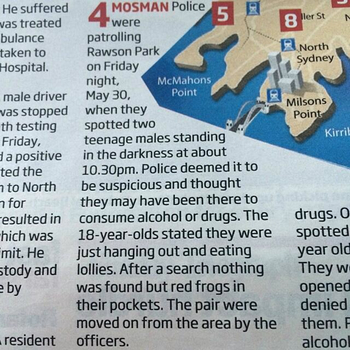 Earlier this evening, Channel TEN journalist Hayden Nelson tweeted this news clipping, and oh how we laughed. But beyond the laughter, there’s something quite sinister here.
Earlier this evening, Channel TEN journalist Hayden Nelson tweeted this news clipping, and oh how we laughed. But beyond the laughter, there’s something quite sinister here.
This item appears to be from one of the Murdochland local suburban papers, and it reads:
Mosman police were patrolling Rawson Park on Friday night, May 30, when they spotted two teenage males standing in the darkness at about 10.30pm. Police deemed it to be suspicious and thought they may have been there to consume alcohol or drugs. The 18-year-olds stated that they were just hanging out and eating lollies. After a search nothing was found but red frogs in their pockets. The pair were moved on from the area by the officers.
I know that the Sydney North Shore suburb of Mosman is a separate planet from the rest of human society, but I seem to recall that when I was 18 years old, some time shortly before the last of the mammoths died out, the local park was about the only place you could go for a private conversation with your mates about… well, life.
Home was obviously out, because your parents were there. Shopping malls were closing, and in any event you can’t just hang around in the mall without buying something. The same goes for pubs and cafés. Not everyone can afford to buy endless beverages, even in Mosman.
The increasing privatisation of public space is a problem. You can’t just walk around the Sydney Harbour Foreshore, for example, without coming under the management of the Sydney Harbour Foreshore Authority and their arbitrary rules enforced by private security guards.
The privatisation of public space even has its own story category at The Guardian.
The roads have been turned over to traffic, not people. What seats you can find to sit on are part of JCDecaux’s advertising empire masquerading as bus shelters, sited right at the edge of the road where their hoardings can be seen, rather than set back from the kerb so you can hear yourself think.
No, the local park is the place for a quiet chat about the hell of growing into adulthood.
“Hanging around” is precisely what public parks are for — and if that’s “in the darkness” it’s because the local council is either stingy with the lighting budget, or understands that it’s not actually healthy for the night to be lit up like a football stadium.
Actually no. It’s “in the darkness” because, der, that’s what happens at nighttime.
Maybe there’s more to this story than meets the eye. But as it’s reported, it seems like these two lads were “deemed to be suspicious” simply because they were teenagers outside after dark, and were asked to move on for no valid reason whatsoever, other than to cover the police officers’ embarrassment with having interfered with people going about their lawful business. And that’s wrong.
[Update 5 June 2014, 0805 AEST: In a comment below I’ve written about the law that apparently applies in this situation. It reinforces my view that what happened here was just plain wrong.]
[This is one of 30 daily posts I’m writing during Blogjune. See them all under the tag blogjune, or subscribe to the RSS feed.]
 Back on 30 June I found myself talking about the phenomenon of “bubbling”, thanks to Rugby League player Todd Carney and a certain photograph.
Back on 30 June I found myself talking about the phenomenon of “bubbling”, thanks to Rugby League player Todd Carney and a certain photograph.

